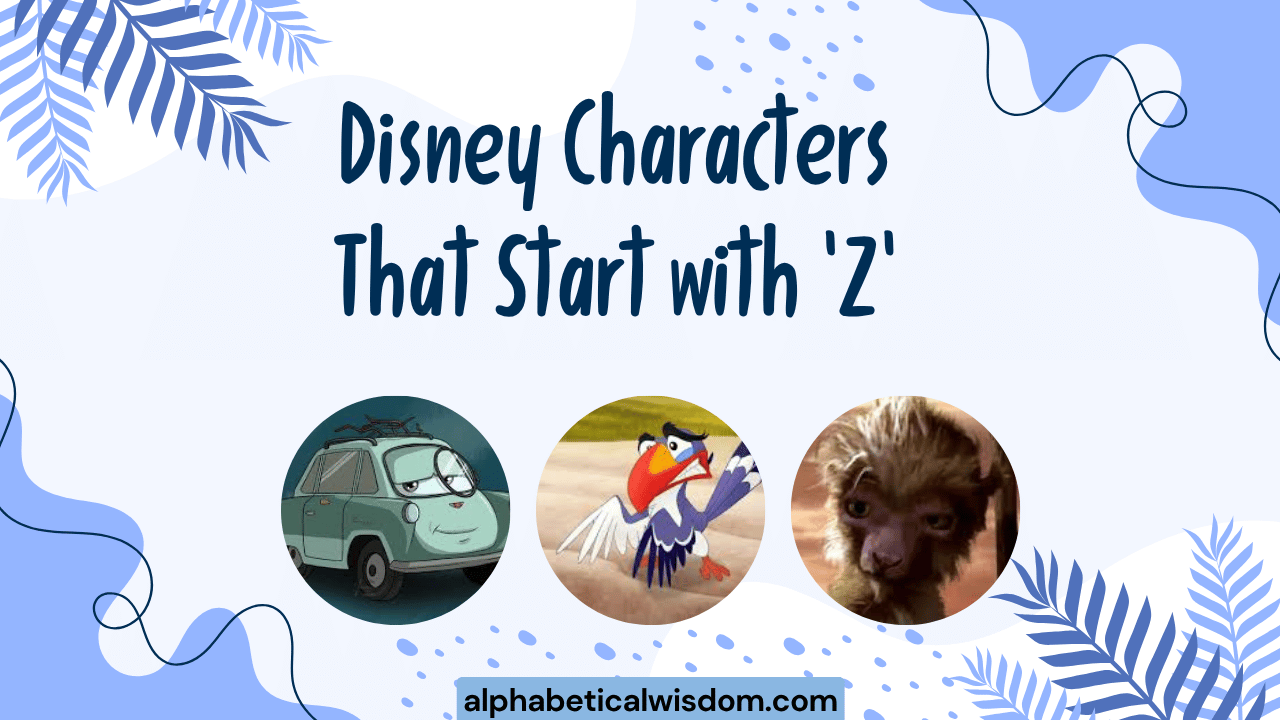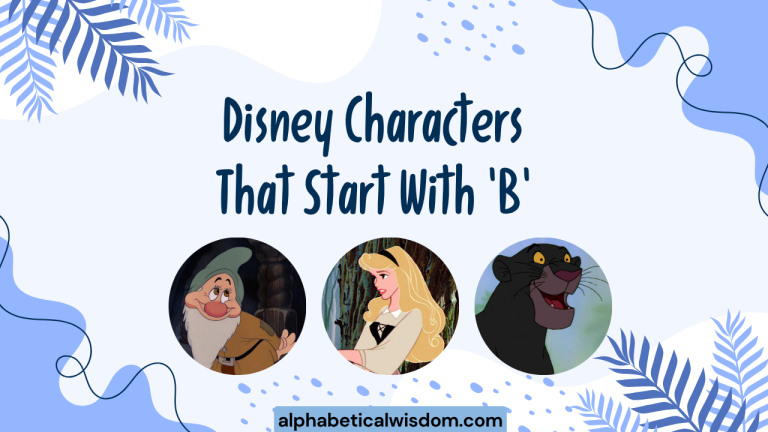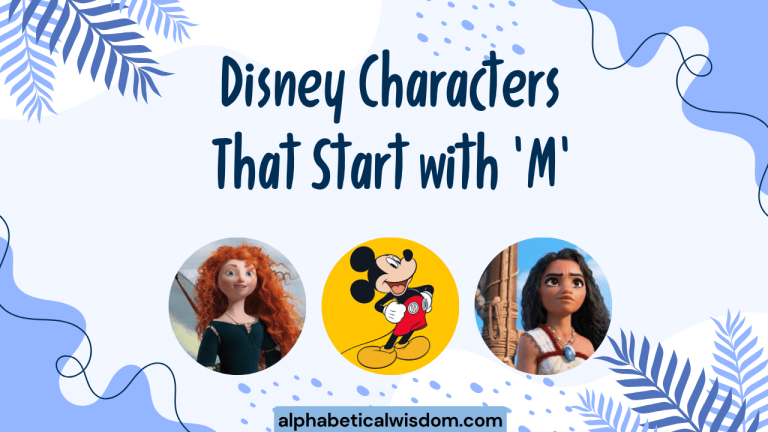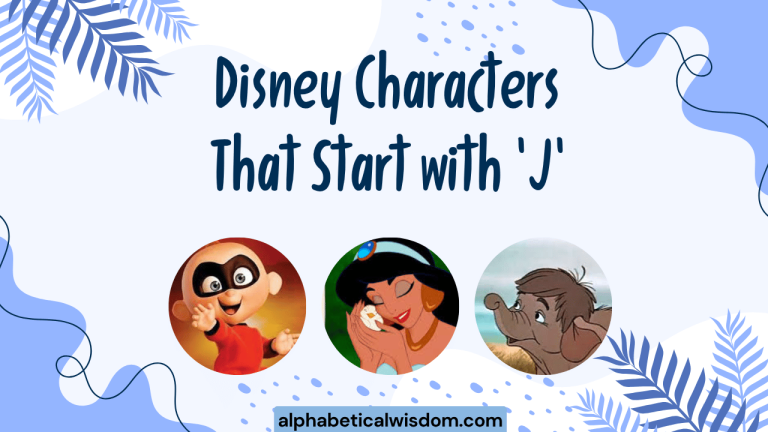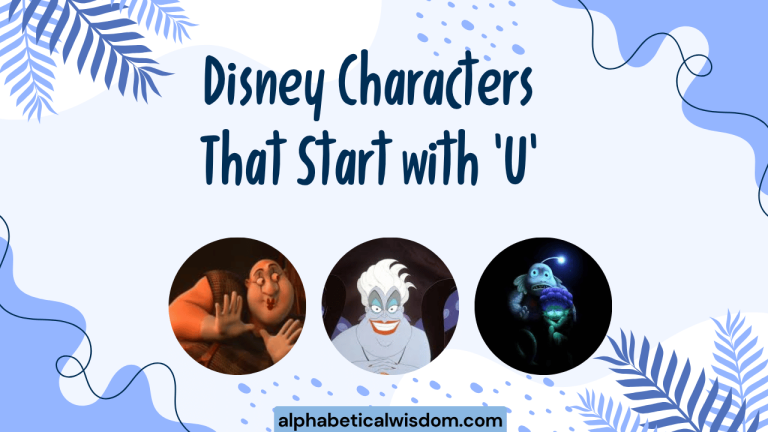Disney Characters Starting with Z: A Grammatical Exploration
Exploring Disney characters, especially those whose names begin with less common letters like “Z,” offers a unique lens through which to examine English grammar. Analyzing character names and associated dialogue allows us to reinforce fundamental grammatical concepts such as noun types, verb usage, and sentence structure.
This article is designed for English language learners of all levels, from beginners looking to expand their vocabulary to advanced students aiming to refine their understanding of complex grammatical rules. By focusing on the engaging world of Disney, we’ll make learning grammar both effective and enjoyable.
Whether you are a student, educator, or simply a Disney enthusiast, this comprehensive guide will enhance your grammatical proficiency while celebrating beloved characters. Through detailed explanations, numerous examples, and practical exercises, you will gain a deeper understanding of English grammar and improve your ability to communicate clearly and accurately.
Table of Contents
- Introduction
- Definition: Nouns and Proper Nouns
- Structural Breakdown: Character Names and Titles
- Types or Categories: Character Roles and Grammatical Functions
- Examples: Disney Characters Starting with Z
- Usage Rules: Applying Grammatical Concepts
- Common Mistakes: Avoiding Grammatical Errors
- Practice Exercises
- Advanced Topics: Complex Sentence Structures
- FAQ: Frequently Asked Questions
- Conclusion
Definition: Nouns and Proper Nouns
A noun is a word that represents a person, place, thing, or idea. Nouns are fundamental building blocks of sentences, serving as subjects, objects, complements, and more. They can be concrete (tangible, like “Zazu”) or abstract (intangible, like “bravery”). Understanding nouns is crucial for constructing grammatically correct and meaningful sentences.
A proper noun is a specific name for a particular person, place, or thing. Proper nouns are always capitalized in English. In the context of Disney characters, “Zazu” is a proper noun because it refers to a specific hornbill from The Lion King. Recognizing proper nouns helps distinguish specific entities from general categories.
Structural Breakdown: Character Names and Titles
Character names often function as proper nouns within sentences. They can be subjects performing actions, objects receiving actions, or parts of prepositional phrases providing additional information.
Understanding how character names fit into sentence structure is essential for analyzing and constructing grammatically sound sentences.
Consider the sentence, “Zazu advises Mufasa.” Here, “Zazu” is the subject of the sentence, performing the action of advising. The name follows the standard subject-verb-object sentence structure. Titles, such as “King” or “Queen,” can also modify character names, adding descriptive information and further defining their roles within the narrative. For example, “King Mufasa” combines a title with a proper noun, creating a more descriptive and specific reference.
Types or Categories: Character Roles and Grammatical Functions
Disney characters can be broadly categorized by their roles in a story, such as protagonists, antagonists, and supporting characters. Each role often corresponds to specific grammatical functions within sentences.
Understanding these correlations can enhance your grammatical analysis skills and deepen your appreciation for storytelling.
Protagonist as Subject
The protagonist is the main character of a story, often the one who drives the plot forward. Grammatically, the protagonist frequently functions as the subject of sentences, performing actions and interacting with other characters.
For instance, if Zazu were the protagonist of a story, sentences might begin with “Zazu did this…” or “Zazu felt that…”. The protagonist’s actions and experiences are central to the narrative, and their grammatical role reflects this importance.
Antagonist as Object
The antagonist is the character who opposes the protagonist, creating conflict and tension in the story. Grammatically, the antagonist often functions as the object of sentences, receiving the actions of the protagonist or other characters. For example, “Simba defeats Zurg” illustrates Zurg acting as the object of the verb “defeats.” The antagonist’s role in the sentence highlights their opposition to the main character.
Supporting Character as Adjective
Supporting characters play various roles in the story, providing assistance, comic relief, or additional perspective. Grammatically, supporting characters can function as adjectives, modifying other nouns and adding descriptive detail.
For example, “Zazu’s advice” uses “Zazu’s” as a possessive adjective, modifying the noun “advice.” This grammatical function emphasizes the supporting character’s contribution to the story.
Examples: Disney Characters Starting with Z
Let’s explore several Disney characters whose names begin with the letter “Z” and analyze their grammatical roles within example sentences. By examining these characters, we can reinforce our understanding of nouns, proper nouns, and sentence structure.
Zazu
Zazu is a major character in The Lion King. He serves as Mufasa’s advisor and is known for his wit and loyalty. Here are some examples of how Zazu’s name is used in sentences:
The following table provides examples of how “Zazu” is used in sentences, illustrating different grammatical roles.
| Sentence | Grammatical Role of “Zazu” |
|---|---|
| Zazu advises Mufasa on kingdom matters. | Subject |
| Mufasa trusts Zazu’s judgment. | Possessive Adjective |
| Scar despises Zazu. | Object |
| The lions respect Zazu. | Object |
| Zazu is a hornbill. | Subject |
| “Report, Zazu!” Mufasa commanded. | Vocative (Direct Address) |
| Zazu flew over the Pride Lands. | Subject |
| Everyone listens to Zazu. | Object |
| Zazu’s reports are always detailed. | Possessive Adjective |
| Simba teases Zazu playfully. | Object |
| Zazu warned of danger. | Subject |
| The pride acknowledges Zazu. | Object |
| Zazu’s loyalty is unwavering. | Possessive Adjective |
| Mufasa relies on Zazu. | Object of preposition “on” |
| Zazu is known for his sharp wit. | Subject |
| Zazu often provides comic relief. | Subject |
| Sarabi appreciates Zazu. | Object |
| Zazu offers valuable advice. | Subject |
| The hyenas dislike Zazu intensely. | Object |
| Zazu keeps a close eye on things. | Subject |
| Everyone trusts Zazu. | Object |
| Zazu’s insights are crucial. | Possessive Adjective |
| Mufasa depends on Zazu. | Object of preposition “on” |
| Zazu is a respected advisor. | Subject |
| Zazu always speaks his mind. | Subject |
| Nala respects Zazu. | Object |
| Zazu is a valuable member of the pride. | Subject |
| Zazu helps to maintain order. | Subject |
Zigzag
Zigzag is one of the vultures in The Jungle Book (1967). Though not a main character, his name provides an opportunity to look at grammatical context.
The following table provides examples of how “Zigzag” can be used in sentences, illustrating different grammatical roles.
| Sentence | Grammatical Role of “Zigzag” |
|---|---|
| Zigzag is one of the vultures. | Subject |
| The other vultures follow Zigzag. | Object |
| Zigzag’s singing is off-key. | Possessive Adjective |
| Mowgli sees Zigzag in the jungle. | Object |
| Zigzag often jokes with his friends. | Subject |
| Zigzag is a fun loving vulture. | Subject |
| Baloo knows Zigzag. | Object |
| Zigzag’s laughter echoes through the trees. | Possessive Adjective |
| The pack includes Zigzag. | Object |
| Zigzag sings with the others. | Subject |
| Zigzag is not the smartest vulture. | Subject |
| The other vultures tolerate Zigzag. | Object |
| Zigzag’s presence adds to the scene. | Possessive Adjective |
| Mowgli interacts with Zigzag. | Object of preposition “with” |
| Zigzag is a minor character. | Subject |
| Zigzag often misunderstands. | Subject |
| The other vultures help Zigzag. | Object |
| Zigzag is a part of the group. | Subject |
| The other vultures know Zigzag well. | Object |
| Zigzag adds to the ambiance of the scene. | Subject |
Zeus
Zeus appears in Hercules. He is the king of the gods and Hercules’ father. Here are some examples of how Zeus’s name is used in sentences:
The following table provides examples of how “Zeus” is used in sentences, illustrating different grammatical roles.
| Sentence | Grammatical Role of “Zeus” |
|---|---|
| Zeus is the king of the gods. | Subject |
| Hera is Zeus’s wife. | Possessive Adjective |
| Hades opposes Zeus. | Object |
| The mortals worship Zeus. | Object |
| Zeus lives on Mount Olympus. | Subject |
| “Thank you, Zeus!” Hercules prayed. | Vocative (Direct Address) |
| Zeus watches over his son. | Subject |
| Everyone respects Zeus. | Object |
| Zeus’s power is unmatched. | Possessive Adjective |
| Hercules admires Zeus. | Object |
| Zeus protects the innocent. | Subject |
| The other gods honor Zeus. | Object |
| Zeus’s decisions are final. | Possessive Adjective |
| The world depends on Zeus. | Object of preposition “on” |
| Zeus is known for his wisdom. | Subject |
| Zeus often intervenes in mortal affairs. | Subject |
| The Titans challenged Zeus. | Object |
| Zeus offers guidance. | Subject |
| The cyclops fear Zeus greatly. | Object |
| Zeus keeps a close watch on everyone. | Subject |
| Everyone fears Zeus’s wrath. | Possessive Adjective |
| Zeus’s judgements are fair. | Possessive Adjective |
| The world depends on Zeus. | Object of preposition “on” |
| Zeus is a powerful leader. | Subject |
| Zeus is respected by all. | Subject |
| The other gods respect Zeus. | Object |
| Zeus is a loving father. | Subject |
| Zeus rules the heavens. | Subject |
Zero
Zero is Jack Skellington’s ghost dog in The Nightmare Before Christmas. Here are some examples of how Zero’s name is used in sentences:
The following table provides examples of how “Zero” is used in sentences, illustrating different grammatical roles.
| Sentence | Grammatical Role of “Zero” |
|---|---|
| Zero is Jack’s ghost dog. | Subject |
| Jack loves Zero’s loyalty. | Possessive Adjective |
| Sally pets Zero. | Object |
| The children adore Zero. | Object |
| Zero glows in the dark. | Subject |
| “Good boy, Zero!” Jack exclaimed. | Vocative (Direct Address) |
| Zero flies through the air. | Subject |
| Everyone likes Zero. | Object |
| Zero’s nose is bright. | Possessive Adjective |
| Jack relies on Zero. | Object |
| Zero leads the way. | Subject |
| The town welcomes Zero. | Object |
| Zero’s presence is comforting. | Possessive Adjective |
| Jack cares for Zero. | Object of preposition “for” |
| Zero is a friendly ghost. | Subject |
| Zero often helps Jack. | Subject |
| The other ghosts like Zero. | Object |
| Zero is a valuable friend. | Subject |
| The children love Zero dearly. | Object |
| Zero keeps Jack company. | Subject |
| Everyone appreciates Zero. | Object |
| Zero’s guidance is appreciated. | Possessive Adjective |
| Jack trusts Zero completely. | Object |
| Zero is a loyal companion. | Subject |
| Zero is always there for Jack. | Subject |
| Sally likes Zero a lot. | Object |
| Zero is a beloved pet. | Subject |
| Zero helps Jack deliver toys. | Subject |
Zurg
Zurg is the main antagonist in the Toy Story franchise. He is Buzz Lightyear’s sworn enemy. Here are some examples of how Zurg’s name is used in sentences:
The following table provides examples of how “Zurg” is used in sentences, illustrating different grammatical roles.
| Sentence | Grammatical Role of “Zurg” |
|---|---|
| Zurg is Buzz Lightyear’s enemy. | Subject |
| Buzz fights Zurg. | Object |
| Zurg’s plans are evil. | Possessive Adjective |
| Buzz hates Zurg. | Object |
| Zurg commands his robots. | Subject |
| “Destroy Zurg!” Buzz shouted. | Vocative (Direct Address) |
| Zurg threatens the galaxy. | Subject |
| Everyone fears Zurg. | Object |
| Zurg’s power is immense. | Possessive Adjective |
| Buzz opposes Zurg. | Object |
| Zurg seeks to conquer. | Subject |
| The toys despise Zurg. | Object |
| Zurg’s ambition knows no bounds. | Possessive Adjective |
| Buzz battles against Zurg. | Object of preposition “against” |
| Zurg is a fearsome villain. | Subject |
| Zurg often plots revenge. | Subject |
| The heroes confront Zurg. | Object |
| Zurg is a powerful enemy. | Subject |
| The heroes defeat Zurg finally. | Object |
| Zurg tries to destroy the galaxy. | Subject |
| Everyone fights Zurg. | Object |
| Zurg’s evil plans are thwarted. | Possessive Adjective |
| Buzz is determined to defeat Zurg. | Object |
| Zurg is a persistent foe. | Subject |
| Zurg is an evil character. | Subject |
| The toys hate Zurg. | Object |
| Zurg is a dangerous enemy. | Subject |
| Zurg threatens the heroes. | Subject |
Usage Rules: Applying Grammatical Concepts
Understanding the rules of English grammar is essential for clear and effective communication. Let’s examine some key rules related to nouns, proper nouns, and sentence structure, using Disney characters as examples.
Subject-Verb Agreement
Subject-verb agreement means that the verb in a sentence must agree in number (singular or plural) with its subject. For example:
- Correct: Zazu advises Mufasa. (Singular subject, singular verb)
- Incorrect: Zazu advise Mufasa. (Singular subject, plural verb)
In the above example “Zazu” is singular, so the verb “advises” must also be singular.
Pronoun Reference
Pronouns must clearly refer to specific nouns in a sentence or paragraph. Ambiguous pronoun reference can lead to confusion.
For example:
- Clear: Zurg is Buzz’s enemy. He is evil. (Pronoun “He” clearly refers to “Zurg”)
- Ambiguous: Zurg fights Buzz. He is strong. (It’s unclear who “He” refers to)
In the ambiguous example, it’s unclear if “He” refers to Zurg or Buzz. Clarity is essential in pronoun usage.
Article Usage
Articles (a, an, the) are used to specify whether a noun is general or specific. “A” and “an” are indefinite articles, used for general nouns, while “the” is a definite article, used for specific nouns.
For example:
- General: Zazu is a hornbill. (General reference to hornbills)
- Specific: Zazu is the advisor to Mufasa. (Specific advisor)
Understanding when to use definite and indefinite articles is crucial for precise communication.
Common Mistakes: Avoiding Grammatical Errors
Even experienced English learners can make grammatical errors. Let’s address some common mistakes related to nouns and proper nouns, providing correct and incorrect examples.
Mistake 1: Incorrect Capitalization of Proper Nouns
- Incorrect: zazu is a hornbill.
- Correct: Zazu is a hornbill.
Mistake 2: Subject-Verb Agreement Errors
- Incorrect: Zurg destroy galaxies.
- Correct: Zurg destroys galaxies.
Mistake 3: Ambiguous Pronoun Reference
- Incorrect: Zurg fights Buzz. He is strong.
- Correct: Zurg fights Buzz. Zurg is strong.
Mistake 4: Incorrect Article Usage
- Incorrect: Zazu is the hornbill.
- Correct: Zazu is a hornbill.
Mistake 5: Misusing Possessive Apostrophes
- Incorrect: Zazus advice is always helpful.
- Correct: Zazu’s advice is always helpful.
Practice Exercises
Test your knowledge with these practice exercises. Each exercise focuses on different aspects of noun usage and sentence structure.
Exercise 1: Identifying Nouns
Identify all the nouns in the following sentences. Indicate whether each noun is common or proper.
| Sentence | Nouns | Type (Common/Proper) |
|---|---|---|
| Zazu advises Mufasa on kingdom matters. | Zazu, Mufasa, kingdom, matters | Proper, Proper, Common, Common |
| Zeus is the king of the gods. | Zeus, king, gods | Proper, Common, Common |
| Zero is Jack’s pet dog. | Zero, Jack, pet, dog | Proper, Proper, Common, Common |
| Zurg is Buzz Lightyear’s enemy. | Zurg, Buzz Lightyear, enemy | Proper, Proper, Common |
| Zigzag is a vulture in the Jungle Book. | Zigzag, vulture, Jungle Book | Proper, Common, Proper |
| The advisor relies on the king. | advisor, king | Common, Common |
| The dog is a loyal friend. | dog, friend | Common, Common |
| The villain is a persistent enemy. | villain, enemy | Common, Common |
| Every character has a role. | character, role | Common, Common |
| The movie is a classic. | movie, classic | Common, Common |
Exercise 2: Correcting Sentences
Correct the grammatical errors in the following sentences.
| Incorrect Sentence | Correct Sentence |
|---|---|
| zazu advise mufasa. | Zazu advises Mufasa. |
| zurg is buzz lightyear enemy. | Zurg is Buzz Lightyear’s enemy. |
| zero glow in the dark. | Zero glows in the dark. |
| zeus is a king. | Zeus is the king. |
| zigzag are a vulture. | Zigzag is a vulture. |
| the movie is good. | The movie is good. |
| character are important. | Characters are important. |
| role is important in a story. | A role is important in a story. |
| friend are loyal. | Friends are loyal. |
| dog is a animal. | A dog is an animal. |
Exercise 3: Sentence Completion
Complete the following sentences with appropriate nouns.
| Incomplete Sentence | Completed Sentence |
|---|---|
| _______ is Mufasa’s advisor. | Zazu is Mufasa’s advisor. |
| Buzz Lightyear fights _______. | Buzz Lightyear fights Zurg. |
| _______ is Jack Skellington’s dog. | Zero is Jack Skellington’s dog. |
| _______ is the king of the gods. | Zeus is the king of the gods. |
| _______ is a vulture. | Zigzag is a vulture. |
| _______ is a classic movie. | Toy Story is a classic movie. |
| _______ are important in every story. | Characters are important in every story. |
| Every story has a _______. | Every story has a role. |
| A dog is a loyal _______. | A dog is a loyal friend. |
| _______ are important. | Animals are important. |
Advanced Topics: Complex Sentence Structures
For advanced learners, let’s explore complex sentence structures involving Disney characters. Complex sentences include independent and dependent clauses, allowing for more nuanced expression.
Consider the following examples:
- Complex Sentence 1: Because Zazu advises Mufasa, the Pride Lands are well-managed. (Dependent clause: “Because Zazu advises Mufasa”; Independent clause: “the Pride Lands are well-managed”)
- Complex Sentence 2: Although Zurg is evil, he is a compelling character. (Dependent clause: “Although Zurg is evil”; Independent clause: “he is a compelling character”)
These examples demonstrate how complex sentences can convey cause-and-effect relationships, contrasts, and other complex ideas. Mastering complex sentence structures enhances your ability to express sophisticated thoughts and arguments.
FAQ: Frequently Asked Questions
Here are some frequently asked questions about noun usage and sentence structure:
- What is the difference between a common noun and a proper noun?
A common noun refers to a general category of people, places, things, or ideas (e.g., “dog,” “movie”), while a proper noun refers to a specific person, place, or thing (e.g., “Zero,” “Toy Story”). Proper nouns are always capitalized.
- Why is subject-verb agreement important?
Subject-verb agreement ensures that the verb in a sentence agrees in number with its subject, making the sentence grammatically correct and easy to understand. Incorrect subject-verb agreement can lead to confusion and misinterpretation.
- How can I avoid ambiguous pronoun reference?
To avoid ambiguous pronoun reference, ensure that each pronoun clearly refers to a specific noun in the sentence or paragraph. If there is any doubt, repeat the noun instead of using a pronoun.
- When should I use the definite article “the”?
Use the definite article “the” when referring to a specific noun that has already been mentioned or is uniquely identifiable. For example, “the king” refers to a specific king known to the audience.
- What is a complex sentence?
A complex sentence contains one independent clause and at least one dependent clause. Dependent clauses cannot stand alone as sentences and are often introduced by subordinating conjunctions like “because,” “although,” or “if.”
- How do I identify the subject of a sentence?
The subject of a sentence is the noun or pronoun that performs the action of the verb. To find the subject, ask yourself “Who or what is doing the action?”
- What is the role of articles in a sentence?
Articles (a, an, the) are used to specify whether a noun is general or specific. “A” and “an” are indefinite articles, used for general nouns, while “the” is a definite article, used for specific nouns.
Conclusion
By exploring Disney characters whose names begin with the letter “Z,” we’ve reinforced key grammatical concepts related to nouns, proper nouns, and sentence structure. Through detailed explanations, numerous examples, and practical exercises, you’ve gained a deeper understanding of English grammar and improved your ability to communicate clearly and accurately.
Whether you’re a student, educator, or Disney enthusiast, we hope this comprehensive guide has enhanced your grammatical proficiency and appreciation for storytelling. Keep practicing and applying these concepts to continue improving your English language skills.
